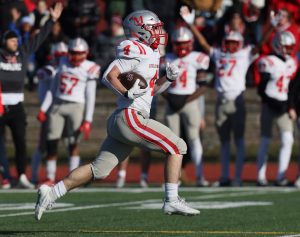
Orioles sign Jorge Mateo, 3 others to 2024 deals, tender contracts to remaining 13 arbitration-eligible players
The band is staying together.
The Orioles entered Friday’s nontender deadline tied for the most arbitration-eligible players in MLB with 17. With a number that high, it was expected that at least one player — perhaps more — would be let go and become a free agent.
Instead, Baltimore signed four players, including shortstop Jorge Mateo and outfielder Ryan McKenna, and tendered contracts to the remaining 13, including slugger Anthony Santander, starting pitcher John Means and outfielders Cedric Mullins and Austin Hays.
Mateo was seen as the most likely candidate to be nontendered given his struggles in 2023 (.607 OPS) and the Orioles’ logjam of young infielders. But Baltimore values Mateo’s speed and glove at shortstop, agreeing to a one-year contract for 2024 worth $2.7 million, according to a source with direct knowledge of the deal, to avoid arbitration.
The club did the same with McKenna, whose versatility as a right-handed hitter against lefties, pinch-runner and late-inning defensive replacement has made him a common fixture on manager Brandon Hyde’s bench in recent years.
The Orioles also agreed to one-year deals with left-handed reliever Keegan Akin and outfielder Sam Hilliard, who the club recently claimed off waivers. McKenna and Hilliard each signed for $800,000, while Akin agreed to a $825,000 contract, according to a source with direct knowledge of the deals. The figures given to Mateo, McKenna and Akin are all in line with what projection websites predicted, while Hilliard received about $300,000 less than what was estimated.
In addition to Santander, Means, Mullins and Hays, Baltimore tendered contracts to the following players: first basemen Ryan Mountcastle and Ryan O’Hearn; left-handers Danny Coulombe, Cole Irvin and Cionel Pérez; right-handers Tyler Wells, Dillon Tate and Jacob Webb; and infielder Ramón Urías. The Orioles and the players’ representatives can negotiate over the next two months or wait for an arbitration hearing to decide their 2024 salaries.
Like Mateo, McKenna and Akin, Tate and Urías were seen as potential nontender candidates. Tate didn’t pitch in the major leagues in 2023 because of a forearm injury, while the team had to weigh Urías’ reliability and versatility versus the potential of its young infield prospects.
Arbitration is a system that provides pay raises to established big leaguers who have yet to spend enough time in the majors to become free agents. Players who have at least three but fewer than six years of MLB service are eligible for arbitration. MLB players become free agents after six years of service.
Having 17 arbitration-eligible players is something executive vice president and general manager Mike Elias described as “an earmark of having a good roster these days” during his end-of-season news conference in October. That tally will also likely mean a higher payroll in 2024.
The 17 players the Orioles either signed or tendered contracts to Friday are collectively estimated to make more than $55 million in 2024, based on the averages of MLB Trade Rumors, Cot’s Baseball Contracts and Spotrac’s projections. In 2023, those players combined to make about $30 million.
The largest projected salary among the Orioles’ arbitration players is Santander, who is projected to make $12.8 million in his final year of arbitration — about $5.5 million more than his 2023 figure.
Means (projected $5.6 million) and Coulombe (projected $2.5 million) are the only other Orioles in their final year of arbitration. Mullins (projected $6.2 million) and Hays (projected $5.8 million), O’Hearn (projected $3.3 million), Tate ($1.5 million) and Mateo all have between four and five years of service.
The remaining nine players are all arbitration-eligible for the first time: Ryan Mountcastle (projected $3.9 million), Wells (projected $2.2 million), Urías (projected $2.1 million), Irvin (projected $1.9 million), Hilliard, McKenna and Webb (projected $1.2 million), Pérez (projected $1.2 million) and Akin .
McKenna and Wells have yet to reach three years of service, but they were granted “Super Two” status by being within the top 22% among players between two and three years of service. The Super Two cutoff this season was two years, 118 days, according to The Associated Press. McKenna and Wells can now have four years of arbitration instead of three. Starting pitcher Dean Kremer was six days short of Super Two eligibility.
Teams and tendered players have until mid-January to negotiate. If an agreement hasn’t been made by Jan. 12, the two sides will put forward their preferred 2024 salary for the player. If a deal still can’t be reached, a panel of arbitrators will pick one of the two numbers — and no other possible value — after a hearing in late January or February.
()

